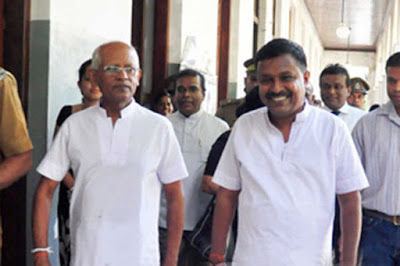We re-publish this article by Mario Andree (The Island) since the facts and the arguements in it are vital. Thanks go to the writer and the newspaper.
Deputy Finance Minister Ranjith Siyambalapitiya said that the Government had spent a total of Rs 23 trillion on the three-decade war.
This works out to Rs. 920 billion per year in the 25 years of war, which is now a saving for the government in addition to the targeted revenue budget per year.
The 2009 targeted revenue was Rs. 855 billion, and the government spends only around Rs. 2 billion on ministers, and Rs 278 billion on development.
According to the previous situation, compared to the current, the tax and price situations have not changed but have increased.
The expenditure towards war can be used for the benefit of the citizens by reducing taxation and prices of daily needs as the expenditure towards war is a balance after the liberation.
He also told the media on Sunday that the policy statement of Gen (Rtd) Sarath Fonseka is an impossible statement to be implemented in the current situation. To provide some of it, an additional funding of Rs. 350 billion will be required apart from the yearly targeted budget.
These statements’ implications definitely will lead to a high amount of currency circulation within the country which will increase the inflation rates of the country leading to a catastrophe of the livelihood, he pointed out.
He also said this is possible with the high tax amounts charged from the public. An amount of Rs. 1,500 will have to be additionally charged from individuals of the country.
Fonseka’s statement
The policy statement states a salary increment of Rs. 10,000 for all government servants.
This would mean that for a staff of 1.2 million the total salary payment would be increased by Rs 144 billion from the treasury, adding another 10 billion on payments of over time and EPF, Minister Siyambalapitiya pointed out.
The media team of President Mahinda Rajapaksa announced a salary increment of Rs. 2,500 for public servants on on Sunday. This will also need an additional funding of Rs. 36 billion, adding another 2.5 billion for other payments.
"With no proper production and value additional developments, will there be a possibility to provide such increases stated in Fonseka’s Policy Statement?" Siyambalapitiya asked.
The restructure of the pension anomalies will for the increase by Rs. 25 billion, yet according to Fonseka’s policy how this is done is unclear and unstated anywhere in his statement, Siyambalapitiya said.
The minimum Samurdhi benefit to increase to Rs. 500 will need an additional funding of Rs. 5 billion, also 98 billion to provide a Rs. 2,000 monthly payment to the youth and the senior citizens and Rs. 900 million to provide the Rs. 3000 to the estimated unemployed 25,000 degree holders with a Rs. 3000 monthly payment, Siyambalapitiya said.
There is also a further requirement of Rs. 30 billion to provide the fertilizer at Rs. 350. Currently, urea is provided at Rs. 350 while the actual amount is Rs. 9,000, this expense is unnecessary as the agriculture segment is gaining at a rapid pace, Siyambalapitiya said.
He has also stated Rs. 27 billion will be needed to pay all Golden Key investors.
Tax benefits
Sarath Fonseka’s policy statement also states the reduction and removal of some taxes on some food items.
Currently rice has no tax charge, the dhal and sugar tax is at Rs. 1 per kg, onions and potatoes are charged at Rs. 5 per kg.
The tax is to protect local producers. If the tax is removed, they will be in a drastic situation.
The reduction of tax on household LP Gas; the current tax is Rs. 108.75 per 12.5 kg cylinder, the total consumption of the country per year is at 850,000 cylinders the reduction will cause a 1,100 million decline of the state revenue, Siyambalapitiya said.
The reduction of petrol prices, as proposed by the court. It was suggested that petrol is supposed to be supplied at Rs 100 per litre. If this is activated, the government will lose Rs. 31,925 million.
Currently, Siyambalapitiya said the government gains Rs. 22,000 million from diesel, Rs. 550 million from kerosene oil and Rs 9,375 million from petrol.
Totally the government will have to lose 350 billion by providing the promises in Sarath Fonseka’s Policy Statement. The reduction of some taxes will lead to high increases in other taxes which will not suit the Sri Lankan Citizens, Siyambalapitiya said.
Implementing the salary increment announced by the current government would also lead to a tax increase or introduction of new taxes.
The Deputy Minister of Finance strongly stated that he would resign from his position the second Sarath Fonseka or his team proves how he is going to find the funds without heaping burdens on the people by increasing or introducing any other taxes.
















